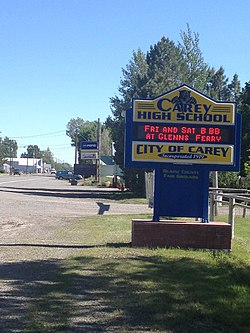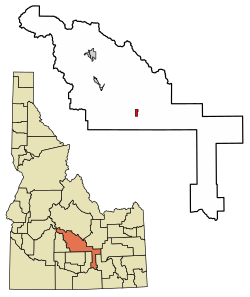2010 census
As of the census [10] of 2010, there were 604 people, 196 households, and 156 families residing in the city. The population density was 182.5 inhabitants per square mile (70.5/km2). There were 240 housing units at an average density of 72.5 per square mile (28.0/km2). The racial makeup of the city was 88.9% White, 0.7% African American, 0.3% Native American, 0.3% Asian, 8.1% from other races, and 1.7% from two or more races. Hispanic or Latino of any race were 12.1% of the population.
There were 196 households, of which 48.0% had children under the age of 18 living with them, 70.4% were married couples living together, 5.6% had a female householder with no husband present, 3.6% had a male householder with no wife present, and 20.4% were non-families. 18.4% of all households were made up of individuals, and 6.7% had someone living alone who was 65 years of age or older. The average household size was 3.08 and the average family size was 3.56.
The median age in the city was 33.4 years. 36.4% of residents were under the age of 18; 4.8% were between the ages of 18 and 24; 24.3% were from 25 to 44; 24% were from 45 to 64; and 10.4% were 65 years of age or older. The gender makeup of the city was 49.2% male and 50.8% female.
2000 census
As of the census [11] of 2000, there were 513 people, 166 households, and 131 families residing in the city. The population density was 153.1 inhabitants per square mile (59.1/km2). There were 187 housing units at an average density of 55.8 per square mile (21.5/km2). The racial makeup of the city was 92.79% White, 0.19% African American, 0.97% Native American, 4.68% from other races, and 1.36% from two or more races. Hispanic or Latino of any race were 10.14% of the population.
There were 166 households, out of which 43.4% had children under the age of 18 living with them, 70.5% were married couples living together, 6.0% had a female householder with no husband present, and 20.5% were non-families. 19.3% of all households were made up of individuals, and 7.2% had someone living alone who was 65 years of age or older. The average household size was 3.09 and the average family size was 3.55.
In the city, the population was spread out, with 35.1% under the age of 18, 10.1% from 18 to 24, 25.0% from 25 to 44, 18.1% from 45 to 64, and 11.7% who were 65 years of age or older. The median age was 30 years. For every 100 females, there were 112.0 males. For every 100 females age 18 and over, there were 110.8 males.
The median income for a household in the city was $39,861, and the median income for a family was $42,054. Males had a median income of $30,809 versus $21,563 for females. The per capita income for the city was $14,027. About 2.6% of families and 1.7% of the population were below the poverty line, including 0.9% of those under age 18 and 6.0% of those age 65 or over.


